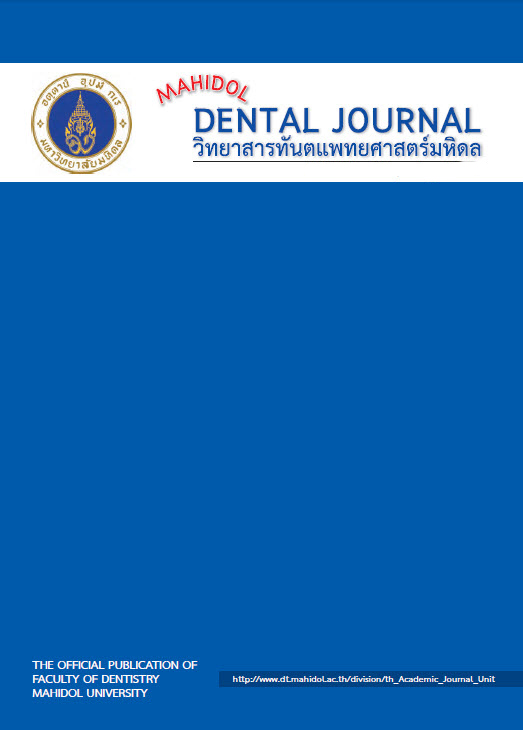Curing process modification of a ‘self-cured’ injection molding material: Effect on surface hardness
Main Article Content
Abstract
Objectives: The objective of this study was to compare the surface hardness of a self-cured injection-molding denture base material, which its curing process was modified from that recommended by the manufacturer, when stored in water at 7 days and 30 days.
Materials and Methods: Ten rectangular specimens (10 mm x 64 mm x 2.5 mm) in three groups of injection-molding denture base materials were prepared from separate mix. The first group contained SR Ivocap® High Impact heat-cured specimens which were polymerized in water at 100°C according to the manufacturer’s instruction (Ivocap wet curing). The second group was IvoBase® Hybrid self-cured injection-molding specimens which were polymerized via the injection machine at 40°C up to120°C (IvoBase dry curing). The third group was IvoBase® Hybrid specimens which were mixed according to the manufacturer’s instruction but the processing method was the same as Ivocap wet curing. The Vickers hardness of the specimens were measured at 7 and 30 days of water storage. Split-plot ANOVA was used to analyze the data at α=0.05.
Results: The surface hardness of IvoBase® Hybrid when polymerized according to the manufacturer’s instruction and when polymerized with a modified method were not significantly different at both 7 days and 30 days storage in water. The surface hardness of IvoBase® Hybrid was significantly higher than that of SR Ivocap® High Impact. The hardness of IvoBase® Hybrid significantly increased when they were stored in water for a longer time from 7 days to 30 days. The surface hardness of SR Ivocap® High Impact significantly decreased with water storage from 7 days to 30 days.
Conclusions: The modified curing technique of IvoBase® Hybrid did not alter the surface hardness characteristics of the material. Time of storage in water had an effect on the material’s hardness differently. The hardness of the self-cured material increased with increasing storage time from 7 days to 30 days, whereas the hardness of the heat-cured material decreased.
Article Details
References
Bahrani F, Safari A, Vojdani M, Karampoor G, Patil S. Comparison of hardness and surface roughness of two denture bases polymerized by different methods. World J Dent 2012; 3:171-5.
Parvizi A, Lindquist T, Schneider R, Williamson D, Boyer D, Dawson DV. Comparison of the dimensional accuracy of injection-molded denture base materials to that of conventional pressure-pack acrylic resin. J Prosthodont 2004; 13: 83-9.
Nogueira SS, Ogle RE, Davis EL. Comparison of accuracy between compression- and injection-molded complete dentures. J Prosthet Dent 1999; 82: 291-300.
Lira AF, Consani RL, Mesquita MF, Nobilo MA, Henriques GE. Effect of toothbrushing, chemical disinfection and thermocycling procedures on the surface microroughness of denture base acrylic resins. Gerodontology 2012; 29: e891-7.
Rajaee N, Vojdani M, Adibi S. Effect of food simulating agents on the flexural strength and surface hardness of denture base acrylic resins. OHDM 2014; 13: 1041-7.
Ali IL, Yunus N, Abu-Hassan MI. Hardness, flexural strength, and flexural modulus comparisons of three differently cured denture base systems. J Prosthodont 2008; 17: 545-9.
Anusavice KJ, Shen C, Rawls RH. Phillips’ Science of Dental Materials. 12 th ed. St. Louis: Elsevier; 2012.
Farina AP, Cecchin D, Soares RG, Botelho AL, Takahashi JM, Mazzetto MO, et al. Evaluation of Vickers hardness of different types of acrylic denture base resins with and without glass fibre reinforcement. Gerodontology 2012; 29: e155-60.
McCabe JF, Walls AWG. Applied Dental Materials. 9 th ed. Oxford: Wiley-Blackwell; 2008.
Neppelenbroek KH, Pavarina AC, Vergani CE, Giampaolo ET. Hardness of heat-polymerized acrylic resins after disinfection and long-term water immersion. J Prosthet Dent 2005; 93: 171-6.
International Organization for Standardization. ISO 20795-1 Dentistry-Base polymers Part 1: Denture base polymers. Geneva, Switzerland ; 2013.
Ivkovic N, Bozovic D, Ristic S, Mirjanic V, Jankovic O. The residual monomer in dental acrylic resin and its adverse effects. Contemp Mater 2013; 1: 85-91.
SR Ivocap® System 2016. Available from: https://www.ivoclarvivadent.us/en-us/p/laboratory-professional/products/removable-denture-prosthetics/materials-for-dentures/sr-ivocap-heat-cure-polymer.
IvoBase® System 2016. Available from: https://www.ivoclarvivadent.us/explore/sr-ivobase.
Okuyama Y, Shiraishi T, Yoshida K, Kurogi T, Watanabe I, Murata H. Influence of composition and powder/liquid ratio on setting characteristics and mechanical properties of autopolymerized hard direct denture reline resins based on methyl methacrylate and ethylene glycol dimethacrylate Dent Mater J 2014; 33: 522-9.
Arora S, Arora A, Upadhyaya V, Goyal A. Evaluation of the mechanical properties of high impact denture base resin with different polymer to monomer ratios: An In vitro study. Indian J Dent Sci 2017; 9: 67-72.
Dogan A, Bek B, Cevik NN, Usanmaz A. The effect of preparation conditions of acrylic denture base materials on the level of residual monomer, mechanical properties and water absorption. J Dent 1995; 23: 313-8.
Bural C, Aktas E, Deniz G, Unlucerci Y, Kizilcan N, Bayraktar G. Effect of post-polymerization heat-treatments on degree of conversion, leaching residual MMA and in vitro cytotoxicity of autopolymerizing acrylic repair resin. Dent Mater 2011; 27: 1135-43.
Lung CY, Darvell BW. Minimization of the inevitable residual monomer in denture base acrylic. Dent Mater 2005; 21: 1119-28.
Lee SY, Lai YL, Hsu TS. Influence of polymerization conditions on monomer elution and microhardness of autopolymerized polymethyl methacrylate resin. Eur J Oral Sci 2002; 110: 179-83.
Braun KO, Mello JA, Rached RN, Del Bel Cury AA. Surface texture and some properties of acrylic resins submitted to chemical polishing. J Oral Rehabil 2003; 30: 91-8.
Moradians S, Fletcher AM, Amin WM, Ritchie GM, Purnaveja J, Dodd AW. Some mechanical properties including the repair strength of two self curing acrylic resins. J Dent 1982; 10: 271-80.
Chandu GS, Asnani P, Gupta S, Khan FM. Comparative evaluation of effect of water absorption on the surface properties of heat cure acrylic: An in vitro study. J Int Oral Health 2015; 7: 63-8.


